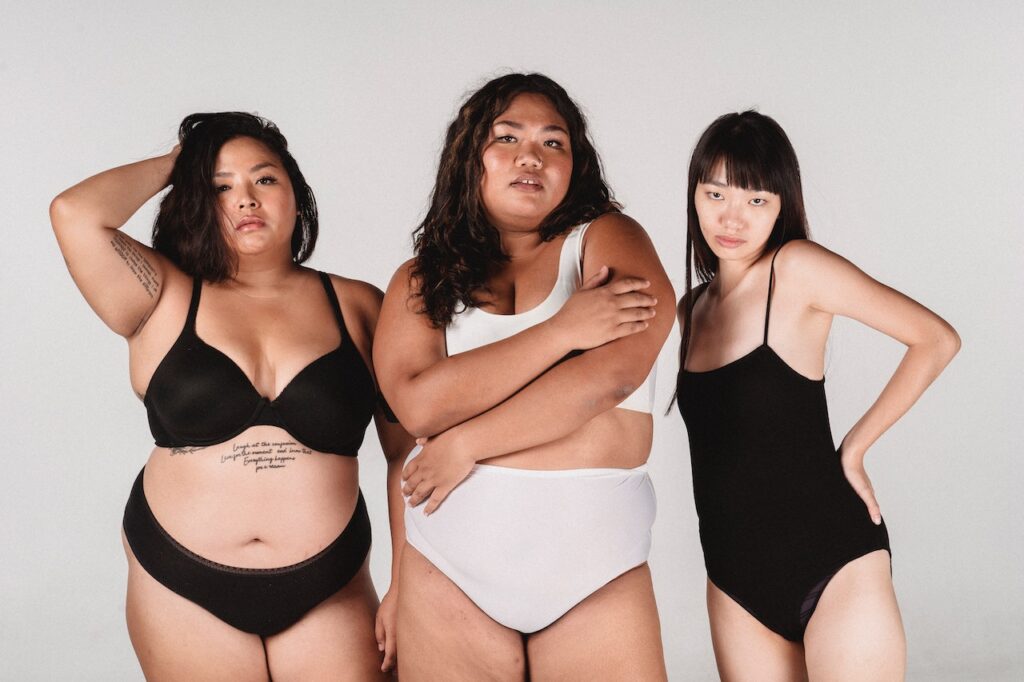Stop fretting over starvation mode. It’s a myth (for the most part). “I feel like I’m starving”, is not the same as someone who is starving. In the latter case, one dies from not having enough to eat – read malnourishment, from not having enough calories as well as vitamins and minerals. You will not starve if you carry excess weight (read body fat). Phew.
However, restrictive dieting (one with a drastic reduction of calories, and/or omission of many foods), or even intermittent fasting (like time-restricted eating) may leave you ravenous and feeling poorly.
“Your body may not be able to provide adequate energy and nutrients to cells in a timely fashion and this can account for why you feel lousy”, says Dr Julinda Lee, functional health doctor and resident health advisor of The Women’s Healthline.

Drastic calorie cuts can drive up hunger responses and sabotage weight loss. Photo by Andres Ayrton, Pexels.
First, let’s address the elephant in the room: Hunger.
It’s not surprising that an unsustainable diet plan – where you cut your calories so drastically that it does not support your total daily energy expenditure (TDEE) – will have you hungry, feeling weak even. Similarly, adopting a new fasting routine, especially when you are used to eating frequently, eating too many calories, or not having nutrient-dense meals, can make you want to eat everything in sight.
There is also an interplay of hormones at work in the background, to regulate energy balance. This also heightens the feeling of hunger.
Ghrelin is our hunger hormone that stimulates appetite. Our ghrelin levels are primarily regulated by food intake, and these levels in the blood, rise before eating and when fasting. The hunger pangs that you experience – that’s ghrelin giving you a kick to eat. Incidentally, ghrelin levels are lower in people who are bigger, when compared with leaner individuals.
An increase in fat stores increases leptin production. This appetite-suppressant ie our satiety hormone is secreted from our fat cells in our adipose tissue. It signals to the brain that “your fat cells are full, stop eating”. When you lose fat mass, you make less leptin. Fasting too can make your leptin levels drop, leading to hunger and appetite increase.
Although having more leptin in the system should regulate appetite, the problem is that many overweight or obese individuals are also leptin resistant – when your brain doesn’t receive the signals as it should and still thinks you’re hungry. This leads to overeating and consequently even more fat storage.

Only one of these bodies may need to worry about starvation mode – it doesn’t afflict people who carry excess weight. Photo by Roberto Hund, Pexels.
Starvation mode affects the real skinny
The body fat that you carry is exactly what prevents you from starving, although too much of it is what makes you overweight. Our fat stores are there to provide us the fuel for energy when the body senses no alternative (food) coming. The body then burns fat to provide calories to sustain you, making up the shortfall.
True starvation mode, therefore, can only impact individuals who are severely malnourished, that have burned through their fat stores and even started catabolising their own muscles for survival – think anorexics or prisoners-of-war, not the average dieter or intermittent faster.
Conservation mode is not starvation
However, your body may go into “conservation mode”, especially when you start to have fewer fat cells, coupled with reduced calorie intake. The body assumes a famine is on (this is an evolutionary response), and its primal instincts for self-preservation kick in. Weight loss is never the body’s priority, even if it is yours – its only concern is to keep you alive.
To maintain a homeostatic energy balance, it starts to down-regulate some of its biochemical processes (like heat generation, reproduction, and muscle synthesis) to be energy efficient. If it feels like you’ve become lazy when you are on a diet, you’re not imagining it – your body is willing you to conserve energy. Unless you’re consciously compensating for it by being active, the inclination is to veg out.
While our metabolism for the most part remains constant throughout the years, our metabolic rate is not static.
Metabolism, as Dr Lee explains, “is not about calories per se. Metabolism is how you utilise fuel for all the functions that the body needs to perform. A leaner person is more metabolically flexible – burning calories either from food or accessing calories from stored fat. Conversely, someone who is overweight has poorer metabolism and ability for lipolysis (fat burning). Eating is their only way to access calories”.
Metabolic rate, however, “specifically refers to the utilisation of calories, that is the burning of energy, in a given unit of time (whether per hour or day),” she clarifies.
Your basal metabolic rate (BMR), is the amount of energy (also read calories) you burn, simply existing. Both exercise and non-exercise-related activity (like fidgeting or taking the stairs) increases calorie expenditure. Together your BMR plus calorie expenditure make up your TDEE.
Bigger bodies need more energy to help them do anything. A heavier person has a higher BMR than a lighter one and needs more calories. A heavier person will also burn more calories during exercise. Having more lean muscle mass also makes you more metabolically active (read a higher BMR).
This can account for the differences in BMR between genders. Even when a man and woman are of the same age, weight, and height, a woman has a lower BMR because women carry more fat than muscles.
Inevitably, dieting or fasting affects your BMR. As you lose weight (likely a combination of fat and muscle unless your exercise is helping to maintain or increase muscle mass) and get lighter, you need less energy to live. Hence you burn fewer calories.
Your metabolism isn’t broken, it’s that your metabolic rate has simply recalibrated and adapted for the slimmer you. You’re not in starvation mode, but it may require you to consume even fewer calories to continue shifting weight.
Why you feel lousy
Even with surplus body fat to burn, one can still feel poorly. You do not imagine it.

Cutting calories too drastically can leave you hungry, weak, and cold. Photo by Andrea Piacquadio, Pexels.
Dr Lee paints us a clearer picture.
“When you drastically cut calories, the feelings of hunger increase, and hunger can be uncomfortable. When you eat in excess, your body uses some of that energy to generate heat. Now because there is a decrease in heat production, you may feel cold. Muscles too can feel weak, because of insufficient glycogen stores,” she says.
She adds that the decrease in blood sugar can increase hunger, but also feelings of anxiety, dizziness, palpitations, and uneasiness.
One biochemical process that takes place in the body is glycogenolysis, in which glycogen that is stored in the liver and our muscles, is broken down into glucose, to provide immediate energy and to maintain blood glucose (during fasting).
Adrenaline (epinephrine) is needed to aid glycogenolysis, and this flight-or-flee response is what’s causing you to feel hangry and irritable.
“Individuals who are insulin-resistant and not so effective at lipolysis (since insulin impacts this), are more likely to be affected,” she says.
What you eat matters
Nutrition plays an active role if you want to be successful at weight management. It also minimises the feeling of general illness that can occur when dieting or fasting.
Fat is your source of calories, but you also need other essential micronutrients – there are 13 essential vitamins (A, B, C, D, E, and K, eight of them are B complex) and many minerals – that the body needs for growth, repair, and optimal health.

More plant-based options keep weight down, improve satiety, and also improve gut health. Photo by Ella Olsson, Pexels.
Adopting an extreme diet can compromise nutrition and create nutritional deficiencies. For example, the Carnivore diet where you eat nothing but animal protein and zero carbs. It excludes all other food groups, including vegetables, fruits, legumes, grains, nuts, and seeds.
Plant fibre is important for maintaining a healthy population of gut bacteria, and plant chemicals (polyphenols) have an important role in the regulation of health in humans.
Minerals versus vitamins
Our body does not make or have the capacity to store all the vitamins and minerals that we need, hence they need to be procured from a balanced and varied diet. When you follow a restricted and restrictive diet, you can short-change your body of what it needs.
“Good diet quality is important whether one is just eating to maintain, lose or gain weight,” reminds Dr Lee.
Vitamins are organic and fragile compounds that can be broken down by heat, air, or acid, while minerals like calcium, potassium, magnesium, or iron, are inorganic elements that are found in soil and water. They are absorbed by plants or consumed by animals and find their way into the body through the food and fluids you consume.
Vitamins are either fat or water-soluble, meaning they either need to be dissolved in fat or water to be accepted by the body. Fat-soluble vitamins, like vitamins A, D, E and K tend to accumulate in the body; however, water-soluble vitamins, like vitamin C and B-complex cannot be stored. What the body doesn’t use is passed out.
Although our body needs these nutrients in small doses (hence the term micronutrients), a deficiency can cause uncomfortable symptoms and ill health in the long term.
When to supplement
Are supplements necessary when you diet or fast?
“Not at all,” says Dr Lee. A calorie reduction is not the same as reducing nutrition, and even in the case of time-restricted eating, there is always an eating window for you to meet your nutritional needs.

Pill-popping is an inelegant replacement for better nutrition. Photo by Laurynas Mereckas, Unsplash.
“You cannot supplement your way out of a bad diet, “she says, pointedly.
She advises: “Eating a wide variety of foods, therefore, ensures you get your essential nutrients. Ideally, mostly from plants, since they are low calorie, yet high in vitamins, minerals, fibre, and antioxidants.”
Since top sources of B vitamins include meat (especially liver), seafood, poultry, and eggs, she notes that “vegans and possibly vegetarians too, may need to supplement with B vitamins.”
Otherwise, additional supplementation is usually not necessary.
